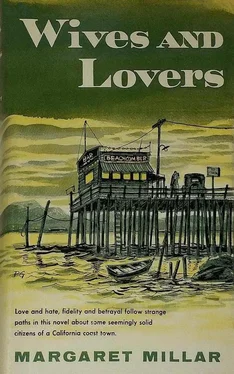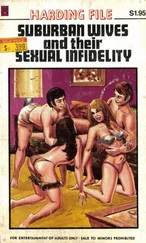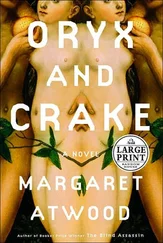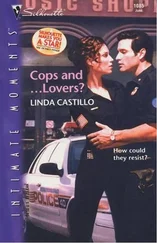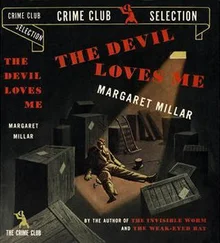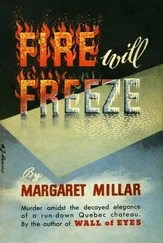George agreed.
“Some people think science is going too far, like this hydrogen bomb for instance. Myself personally, I’m not worried, though the other day something funny certainly happened. I’d bought this fish down at Marchetti’s, and when I opened the package it just seemed to fairly glow. I thought it might be one of those Bikini fish that got bombed. Do you think that’s likely?”
“No.”
“I guess not. I ate it and I feel the same. Here’s Ruby now.”
Mrs. Freeman moved aside with reluctance and Ruby took her place at the screen door. Beside Mrs. Freeman she looked extraordinarily slight and pallid. Her eyes were glowing like Mrs. Freeman’s fish, and George had to stifle a wild impulse to laugh.
“Ruby, I just came to — the fact is, you ran off without collecting your pay.”
Ruby bent her head and the white skin of her forehead pressed against the screen.
“I thought you might need the money so I looked you up. I had a hard time finding you. You didn’t leave an address.”
“I’m not so anxious for people to find me that I go around leaving my address,” Ruby said with soft scorn. “As for the pay, that’s perfectly all right. I broke some dishes anyway.”
“That doesn’t matter.”
“It does to me. You can take the money and buy some new dishes.”
“Don’t be silly,” George said, scowling. “It’s your money. You earned it.”
“Well, I don’t want it. Keep it yourself.”
In the background Mrs. Freeman’s bosom heaved with pride. This was the kind of tourist home she kept, yes-sirree. Her girls might be poor but they had a nice noble attitude towards money. Still, if Ruby had actually earned the money, she would be a fool not to take it.
“If you earned the money, my dear,” Mrs. Freeman said, “you’ll only be accepting your just deserts.”
Ruby uttered a sharp little laugh. “Everybody is very concerned about me all of a sudden, I must say. It’s certainly funny.”
“All right, forget the money,” George said. “What I came for was to apologize. I was — I lost my temper and I’m sorry, see? I’m sorry. Damn it” — he turned his scowl on Mrs. Freeman — “isn’t there any place we can talk?”
“Talk?” Mrs. Freeman’s eyebrows shot up. All her suspicions of men, some born and bred in her and the others picked up along the way of a life with the truant Mr. Freeman, were apparent in the look she gave George. Talk? Talk, indeed. I know men.
“You can talk in the parlor,” she said, firmly enough to indicate to George that she would be right outside in the hall while the talking was going on.
George opened the screen door and stepped inside. As the door closed his coat sleeve brushed Ruby’s bare arm. She shrank away from him, as if the contact had pained her, and ducked into the parlor. She bumped her shin against a leatherette hassock and almost fell, but when George put out his hand to help her regain her balance, she jerked her elbow and its sharp point caught him on a vein in the back of his hand. It stung for a moment like an insect bite.
“Oh.” She put her hand up and covered her mouth. “I’m sorry — I didn’t mean—”
“Didn’t you?”
“No. No. ”
“All right,” George said heavily. “I take your word for it, Ruby.”
Mrs. Freeman coughed subtly and closed the parlor door. She was convinced of one thing — that Mr. Anderson was a fool to take Ruby’s word for anything. Ruby was a liar. During her fifteen years as a landlady, Mrs. Freeman had become a fairly accurate judge of character and she could invariably spot a liar, all the more readily because she was such a plausible liar herself.
Mrs. Freeman’s lies were nearly always written down in letters and were nearly always attempts to conceal her position in life or to justify it. She was a prodigious letter writer. She kept in touch with all her relatives back east, second cousins and nieces by marriage and even the new wives and husbands of divorced or defunct members of the tribe. She also had six pen pals, acquired through a pulp magazine: Middle-aged woman with cultural interests, fond of good music and literature, would appreciate hearing from women of similar interests, eastern background. How about a letter? California Caroline.
Caroline Freeman had become a letter-writer for a number of reasons. She was lonely. She could tolerate her life more easily if she glamorized it on paper, and she could even sometimes force herself into believing some of her own highly idealized versions of the truth: “I honestly felt, Mildred, that it would be a sin and a shame not to open my beautiful home to some of these poor unfortunate girls who have no place to lay their heads.”
Occasionally she mentioned Mr. Freeman’s spasmodic disappearances: “Poor Robert had not been feeling himself lately and has gone down to Palm Springs for the dry desert air. With the sea practically at our front door we naturally get a good deal of humidity!” When Mr. Freeman returned, in need of funds, badly under the weather, and with his face cherry red from overindulgence, Mrs. Freeman recorded the fact that Robert had come back from Palm Springs with a bad sunburn and the desert air hadn’t done him much good after all.
The ink that flowed from Mrs. Freeman’s pen was an unguent pouring over reality. It was true that she lived a few yards from the main north-south highway and had to listen all night to the purr and splutter of engines, the squeaking of brakes and the roaring of trucks. But it was also true that this highway had a beautiful and glamorous name, El Camino del Mar, and it was always a great satisfaction to Mrs. Freeman to write her address in the upper right-hand corner of her notepaper: 1906 El Camino del Mar. No one would ever suspect that it was a road lined with wooden shacks, filled eternally with the smoke of diesel engines and the soot from the Southern Pacific Railroad whose tracks lay parallel to the highway.
At times Mrs. Freeman was afraid that some of her correspondents might come to see her and find out about the neighborhood she lived in, and the highway and the tracks. She guarded against this possibility as well as she could by writing to no one further west than Chicago. This allowed a decent mileage between reality and fiction. She was, moreover, fairly certain that none of her correspondents had sufficient money for a long trip west, in spite of the claim of her pen pal, Flossie from Florida, that she owned a huge orange grove. Mrs. Freeman had the same percentage of belief in Flossie’s orange grove as she had in Mr. Freeman’s sojourns in Palm Springs or the Sierras.
No matter how many letters she wrote, Mrs. Freeman never suffered from lack of material because she had a keen eye, and she was an avid newspaper reader and an enthusiastic walker. She would walk for miles, especially after dinner in the summertime, consciously and deliberately seeing things that most other people would miss. She examined each flower and shrub, every car parked at the curb, the children playing on the sidewalks, the evening strollers like herself. She watched the mountains turn from blue to gray and disappear. She looked into the windows of houses and saw the people inside, eating or reading the paper, listening to the radio, quarreling, washing dishes, and she had a friendly curiosity about all these people.
Afterwards, Mrs. Freeman described her walks in detail, always managing to bring in the exotic street names that she dearly loved. “I strolled up Alameda Padre Serra and over to Plaza Rubio, and finally ended up on Salsipuedes!”
The weather was a constant source of material. Mrs. Freeman, however, did not content herself with mere temperature reports. She injected drama into a cloudy day by describing the fog rolling in from the sea, and into a windy day by stating that “the small craft warnings are up, all up and down the coast!” Calm, sunny days were provided with an element of terror by Mrs. Freeman’s favorite phrase, “earthquake weather.” The more beautiful the day, the more sinister the growl of the earth beneath it. Thus, Mrs. Freeman’s correspondents got the impression that she lived in the crater of a volcano with the earth forever teetering under her house. This impression served two purposes. It made Mrs. Freeman feel that she did indeed live dangerously, and it discouraged her pen pals from planning a visit to this perilous spot. Flossie of Florida had even gone so far as to remark that she wouldn’t live in California for all the money in the world — hurricanes Florida might have, yes, but an earthquake practically every day would upset her nervous system. This statement stimulated Mrs. Freeman’s imagination, and she replied by return mail, describing how only that morning the whole house had shuddered, the windows rattled, and the chandelier in the parlor swung like a pendulum. She neglected to add that this was a regular occurrence, caused not by an earthquake, but by an S. P. freight train.
Читать дальше
